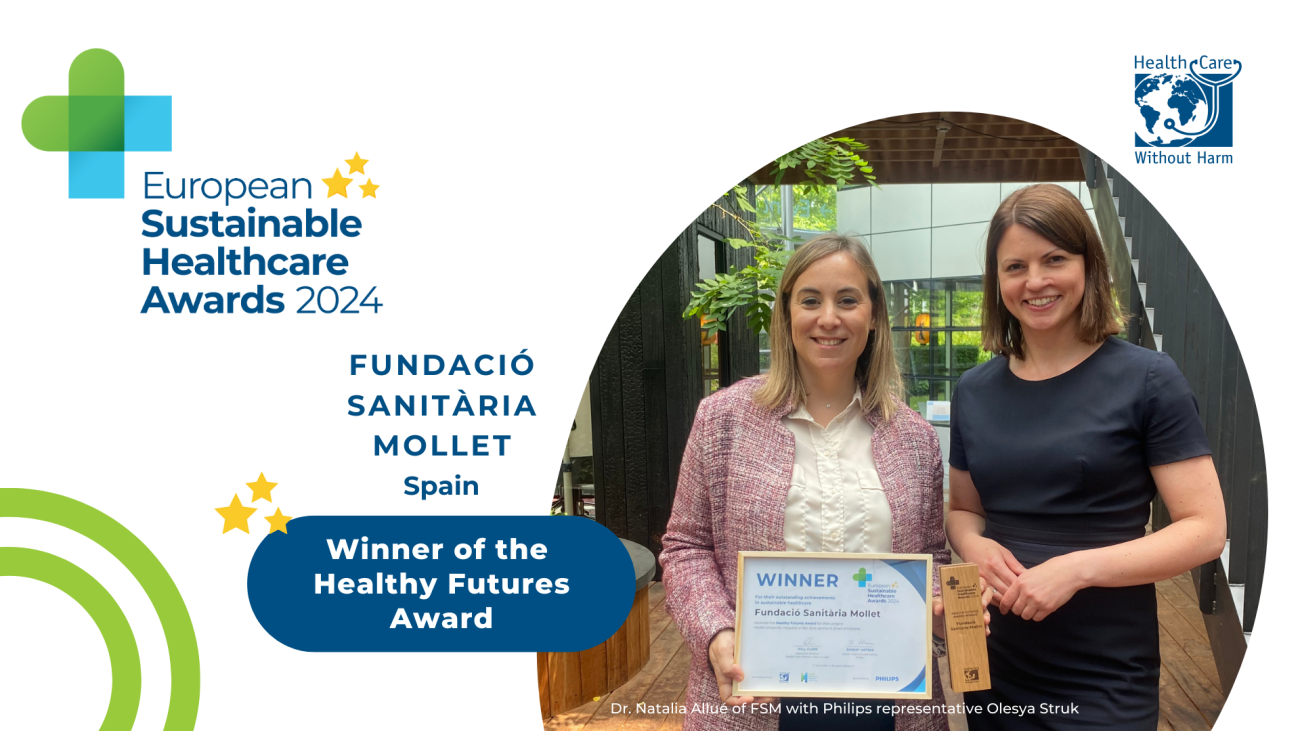
A conversation with the Healthy Futures Award winners
At the 2024 European Sustainable Healthcare Awards, HCWH Europe recognised Fundació Sanitària Mollet (FSM) with the Healthy Futures Award for their outstanding efforts in creating a net-zero and toxic-free future for healthcare through making their Mollet University Hospital a net-zero centre in direct emissions. FSM is a non-profit organisation providing public social and health services in the Vallès area, near Barcelona, Spain. This award aims to spotlight projects that significantly reduce CO₂e emissions at their facility, putting the healthcare sector on the path to zero emissions.
We spoke with Miguel Ángel Martínez Sánchez, Directorate of Environment, Health & Safety, and Dr Natalia Allué, Medical Assistance Director, to learn about their organisation’s approach to sustainable healthcare.
Four pillars for a strong sustainability foundation
FSM's journey towards sustainability is built on four key pillars: governance, infrastructure improvement, processes improvement, and green culture & education.
Touching on infrastructure, Miguel Ángel explained, "Our hospital was designed with sustainability in mind from the outset. Since its construction in 2010, the hospital was already equipped with a geothermal plant, rainwater collection systems, and efficient radiant roofs. Later on, we've incorporated features like such as solar panels, water-saving systems, and energyefficient windows systems. We continue to improve and add sustainable elements to our infrastructure."
Fostering a culture of sustainability
Regarding the green culture pillar, Natalia highlighted the importance of engaging staff in sustainability efforts. "We've established a network of Sustainability Ambassadors across different departments. These individuals are empowered to identify and implement sustainability measures within their specific areas. It's a bottom-up approach that complements our top-down strategies."
Achievements in emission reductions
One of FSM's most significant achievements has been reducing their Scope 1 and 2 emissions by an impressive 91% since 2012. Miguel Ángel noted, "We're now focusing on reducing our remaining emissions, particularly from natural gas consumption. We've already cut this by 24% compared to 2022. We're also exploring alternatives like hydrolysis plants for obtaining medical oxygen and hydrogen to replace natural gas entirely or replacing natural gas boilers with electric heat pumps."
The hospital has made remarkable progress despite increasing its activity by 50% and staff by 30% since 2010. They've also tackled sources of emissions,such as anesthetic gases. "We've incorporated capture filters and promoted best practices like intravenous and low-flow anesthetic techniques to reduce these emissions," Miguel Ángel added.
FSM's approach works with the broader community, not just its immediate staff and operations. Natalia explained,
"We're working towards achieving net zero for Scope 3 emissions by 2040, [which includes] expanding our focus to include the broader community, promoting concepts like One Health and planetary health."
Both Directors emphasised the importance of creating a culture of sustainability. "About 25% of our 1,400 staff are now involved in our sustainability initiatives," Natalia stated. "It's not just about big investments like solar panels. Small, consistent changes can lead to significant long-term benefits."
Miguel Ángel stressed the importance of a systemic vision: "You need to involve the entire community, from leadership to staff, suppliers, and patients. Sustainability must be integrated into the organisational culture and practices." He added, green culture also includes suppliers, staff, and community. Making mistakes, and progressing slowly but steadily, are essential.
Commitment is key
For healthcare organisations looking to embark on similar journeys, the FSM team offered their best piece of advice. "Start with securing commitment from top management," Miguel Ángel recommended.
"Appoint a dedicated person responsible for environmental care, set measurable objectives, and prioritise actions based on a thorough diagnosis of your center and community."
With her medical background showing through, Natalia added, “Take it step by step. It's like advising a patient – don't try to lose 40kg overnight. Make small, consistent changes."
Modelling sustainable healthcare
FSM's success serves as an inspiring example for healthcare facilities across Europe. Despite limited support from public institutions, they've managed to create a comprehensive, effective approach to sustainability. Their work proves that with commitment, innovation, and most of all, collaboration, the healthcare sector can indeed lead the way in creating a greener, healthier future for all.
To follow FSM's progress, visit their website's dedicated green hospital project section.
Join our Global Green and Healthy Hospitals network
Join our Global Green and Healthy Hospitals (GGHH) network to connect with FSM - they are are active members, continuously sharing best practices in sustainable healthcare with other members. By joining GGHH you will become part of a growing global sustainable healthcare movement, and access resources to help you move forward.